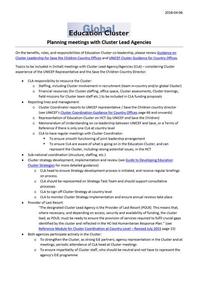Resources
Request support on coordination, information management, capacity development or other education in emergencies areas.
Demande de soutien en coordination, gestion de l’information, développement des capacités et autres domaines de l'éducation en situation d'urgence.
لطلب الدعم في مجال التنسيق ، إدارة المعلومات ، تنمية القدرات أو في اي مجال من مجالات التعليم في مناطق الطوارئ
Solicitar apoyo en coordinación, gestión de la información, desarrollo de capacidades u otra áreas en educación en emergencias.
Featured Resources
below you can find selected tools

COVID-19 Resources
View resources to support education in emergencies coordination during the COVID-19 pandemic.

Guidance on Education Cluster Co-Leadership Arrangements at the Country Level
Indicative Guidance for the establishment and management of co-leadership arrangements at the country level.

Inter-agency Network for Education in Emergencies
For technical education in emergencies resources, please visit the INEE website.
IOM Displacement Tracking Matrix (DTM) for the Education Cluster: A Guidance
Guidance on obtaining useful data from IOM’s Displacement Tracking Matrix (DTM) to inform emergency education planning and response
- Coordination: Needs Assessment, Information Management
- HPC: Implementation & Monitoring, Needs Assessment & Analysis, Strategic Planning
Planning Meetings with Cluster Lead Agencies
This document contains guidance around topics that should be included in (initial) meetings with Cluster Lead Agency/Agencies (CLA) – considering Cluster experience of the UNICEF Representative and the Save the Children Country Director:
- Coordination: Coordination, Cluster Management, Leadership
- HPC: Strategic Planning
Guide to Developing Education Cluster Strategies
The purpose of this Guide and accompanying Strategy Package is to provide practical, relevant guidance and resources to education in emergencies (EiE) coordination staff on how to develop and update an Education Cluster Strategy.
- Coordination: Cluster Strategy, Inter-Sector Coordination
- HPC: Strategic Planning
- Technical Areas: Accountability to Affected Populaiton, Localisation
Localisation in Coordination
"The World Humanitarian Summit recognised that increased localisation is fundamental to the delivery of a dignified and effective humanitarian response, concluding that humanitarian action should be “as local as possible, as international as necessary.” The associated Grand Bargain emphasized the…
- Coordination: Coordination, Cluster Strategy, Inter-Sector Coordination
- HPC: Strategic Planning
- Technical Areas: Localisation
Inter-Sector Integration Tip Sheet
Clusters/Working Groups should have direct conversations with each of the different sector’Technical Advisors to ensure that activities are planned in an integrated fashion wherever possible. Identify activities that are complementary to each other, discuss them with the team at large during team…
- Coordination: Coordination, Cluster Strategy, Inter-Sector Coordination
- HPC: Implementation & Monitoring, Strategic Planning
Humanitarian Profile Support Guidances
The objective of this guidance is to provide an overview of definitions, methods and good practice on how to derive overall, inter-sectoral humanitarian population figures. These include estimates of the number of people affected by a given emergency as well as in need of, targeted by and reached…
- Coordination: Cluster Strategy, Needs Assessment, Information Management
- HPC: Implementation & Monitoring, Needs Assessment & Analysis, Strategic Planning
Guidance on Working with Governments
How can a Cluster promote partnership with (sub-)national governments?Close coordination and collaboration with government efforts in a humanitarian response is an essential part of the cluster approach. The nature of these links will depend on the emergency context and the willingness, capacity…
- Coordination: Coordination, Cluster Management, Leadership
- HPC: Implementation & Monitoring, Needs Assessment & Analysis, Operational Peer Review and Evaluation, Resource Mobilisation, Strategic Planning
Calculating People in Need Guidance
Guidance and instructions to help coordination teams calculate people in need of EiE.
- Coordination: Cluster Strategy, Needs Assessment, Information Management
- HPC: Needs Assessment & Analysis, Strategic Planning
Module de Référence pour la Coordination Sectorielle au niveau national
Ce Module de Référence décrit les principaux éléments de la coordination sectorielle et a été élaboré comme outil de référence pour les intervenants afin de soutenir leurs activités et d'améliorer l'efficacité de la réponse humanitaire.
- Coordination: Coordination, Cluster Management, Leadership
- HPC: Implementation & Monitoring, Needs Assessment & Analysis, Operational Peer Review and Evaluation, Resource Mobilisation, Strategic Planning
MODULE DE RÉFÉRENCE DE L’IASC POUR LA MISE EN ŒUVRE DU CYCLE DE PROGRAMME HUMANITAIRE
The IASC Reference Module for the Implementation of the Humanitarian Program Cycle defines the roles and responsibilities of international humanitarian actors and the way that they interact with each other, national and local authorities, civil society and with people affected by crises. This…
- Coordination: Coordination, Cluster Strategy, Needs Assessment, Information Management
- HPC: Implementation & Monitoring, Needs Assessment & Analysis, Operational Peer Review and Evaluation, Resource Mobilisation, Strategic Planning
- Technical Areas: Accountability to Affected Populaiton
Filter results
Coordination(selected )
Country(selected )
Humanitarian Programme Cycle(selected )
Language(selected )
Publication Date(selected )
Publisher(selected )
Resource Type(selected )
Technical Areas(selected )
Can’t find what you’re looking for?
Contact your relevant language Help Desk










